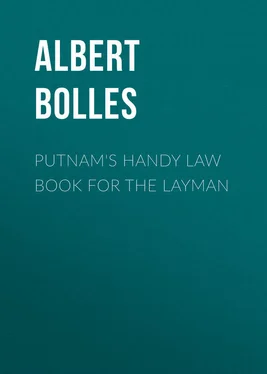Albert Bolles - Putnam's Handy Law Book for the Layman
Здесь есть возможность читать онлайн «Albert Bolles - Putnam's Handy Law Book for the Layman» — ознакомительный отрывок электронной книги совершенно бесплатно, а после прочтения отрывка купить полную версию. В некоторых случаях можно слушать аудио, скачать через торрент в формате fb2 и присутствует краткое содержание. Издательство: Иностранный паблик, Жанр: foreign_antique, foreign_prose, на английском языке. Описание произведения, (предисловие) а так же отзывы посетителей доступны на портале библиотеки ЛибКат.
- Название:Putnam's Handy Law Book for the Layman
- Автор:
- Издательство:Иностранный паблик
- Жанр:
- Год:неизвестен
- ISBN:нет данных
- Рейтинг книги:5 / 5. Голосов: 1
-
Избранное:Добавить в избранное
- Отзывы:
-
Ваша оценка:
- 100
- 1
- 2
- 3
- 4
- 5
Putnam's Handy Law Book for the Layman: краткое содержание, описание и аннотация
Предлагаем к чтению аннотацию, описание, краткое содержание или предисловие (зависит от того, что написал сам автор книги «Putnam's Handy Law Book for the Layman»). Если вы не нашли необходимую информацию о книге — напишите в комментариях, мы постараемся отыскать её.
Putnam's Handy Law Book for the Layman — читать онлайн ознакомительный отрывок
Ниже представлен текст книги, разбитый по страницам. Система сохранения места последней прочитанной страницы, позволяет с удобством читать онлайн бесплатно книгу «Putnam's Handy Law Book for the Layman», без необходимости каждый раз заново искать на чём Вы остановились. Поставьте закладку, и сможете в любой момент перейти на страницу, на которой закончили чтение.
Интервал:
Закладка:
Whether the authorized act arises from a contract or from a wrong or tort, whoever with knowledge of all the facts adopts it as his own, or knowingly appropriates the benefits, which another has assumed to do in his behalf, will be deemed to have assumed responsibility for the act. Of course, such action does not render an act valid that was invalid before; its character in this respect is not changed by anything the ratifier may do.
Can a forgery be ratified? The right of the state to pursue the forger cannot be defeated by its ratification, but so far as the act may be regarded merely as the act of an unauthorized agent, it may be ratified like any other. Mechem says that if at the time of signing, the person doing so purported to act as agent, the act might be ratified.
Again, a principal cannot accept part of an agent's act and reject the remainder. The acceptance or rejection must be complete.
In appointing an agent the principal has in mind the qualifications of the person appointed, he cannot therefore without his principal's consent, designate or substitute another person for himself. This rule though does not prevent him from employing other persons for a minor service. Indeed, in many cases a general agency requires the employment of many persons to execute the business. How far one may go in thus employing others to execute the details, and how much ought to be done by the general agent himself, depends on the nature of the business. The inquiry would be one of fact, to what extent is a general agent in his particular business expected or assumed to do the things himself.
One rule to guide an agent is this: when the act to be done is purely mechanical or ministerial, requiring no direction or personal skill, an agent may appoint a subagent. Thus an agent who is appointed to execute a promissory note, or to sign a subscription agreement, or to execute a deed, may appoint another to do these things. Likewise an agent who is authorized to sell real estate with discretionary power to fix the price and other terms, may employ a subagent to look up a purchaser, or to show the land to one who is desirous of purchasing.
When a person is really acting as an agent, but this is not known by the persons with whom he is doing business, he is liable to them as if he were the principal. It often happens for various reasons that agents do not disclose their principals. Suppose a dealer finds out that the agent presumably acting for himself was, in truth, acting for another, could the real principal be held responsible and the agent escape, or could both be held? The answer is, after discovering the real principal, both can be held, or either of them. The failure of an agent to disclose his agency will not make him individually liable if the other party knew that he was dealing with a principal with whom he had had dealings through the agent's predecessor. Notice of the agency to one member of a firm is not sufficient notice to the firm to release the agent from personal responsibility in subsequent transactions with another member who did not know and was not informed of the agency. Again, the liability must be determined by the conditions existing at the time of the contract, his subsequent disclosure will not relieve the agent. Finally, while the agent may be held in such a case, the principal also is liable, except on instruments negotiable and under seal, on the discovery of his relationship as principal.
While secret instructions to an agent that are unknown to persons dealing with him do not bind them, the principal is liable for any acts within the scope of his agent's authority connected with the business conducted by his agent for him. Some very difficult questions arise in applying this rule. A car conductor is instructed to treat passengers civilly and to use no harsh means with them, save in extreme cases. How far may a conductor go with a disorderly passenger? Very likely he would be justified in putting him off; suppose the conductor was angry and administered hard and needless kicks in the operation? His principal surely would not be liable, though the conductor doubtless would be. Suppose in buying a railway ticket the agent loses his temper and calls you a liar and a thief, you would have an action against him for slander, unless you happened to be one, but you would have no action against his principal for the company did not employ him to slander its patrons; to do this was clearly not in the scope of his employment.
An agent must not act for both parties in any transaction unless this is understood by both of them. Nor can an agent receive any personal profit from a transaction. Whatever profit there may be should be given to the principal. Thus if an agent is authorized to buy a piece of property for his principal and buys it for himself, or hides the transaction under the name of another, the principal, after discovering what his agent has done, can proceed to obtain the property.
An agent must be faithful and exercise reasonable skill and diligence. Money belonging to the principal should be deposited in the principal's name, or, if in the agent's name, his agency should be added; otherwise if the bank failed the agent would be responsible for the loss. Again, if the agent deposited the money in his own name the true owner could proceed against the bank to recover it.
A principal is liable for the statements and representations of his agent that have been expressly authorized. He is also liable even for false and fraudulent representations made in the course of the agent's employment, especially those resulting in a contract from which the principal reaped a benefit. Even though the statements may not have been expressly authorized, such authority may be implied by law because they are the natural and ordinary incidents of the agent's position. Thus the position of a business manager often calls for a great variety of acts, orders, notices, and the like, and statements made while performing them are regarded as within the line of his duty.
An agency may end at a fixed time, or when the particular object for creating it has been accomplished, or by agreement of the parties. In many cases an agency is created for an indefinite period, and in these either party can terminate it whenever he desires. There are some limitations to this principle. Neither party can wantonly sever the relation at the loss of the other; and if one of them did he would be liable for the damage sustained by the other. Likewise if the agent has an interest of his own in the undertaking the principal cannot terminate it before its completion without the agent's consent. Such a rule is needful for his security. The bankruptcy of a business agent operates as a revocation of his authority, but not when the act to be done is of a personal nature like the execution of a deed.
If the principal becomes insane and unable to exercise an intelligent direction of his business, his condition operates as a revocation or suspension for the time being of his agent's authority. If on recovering, he manifests no will to terminate his agent's authority, it may be considered as a mere suspension, and his assent to acts done during the suspension may be inferred from his forbearing to express dissent when they come to his knowledge. Likewise an agent's insanity terminates or suspends the agency for the time being unless he has an interest of his own in the matter. Partial derangement or monomania will not have that effect unless the mania relates to the agency, or destroys the agent's ability to perform it.
Again, the marriage of a principal in some cases, unless a statute has changed the common law, will revoke the power previously given, especially when its execution will defeat or impair rights acquired by marriage. Thus should a man give a power of attorney to another to sell his homestead, but before effecting a sale the principal should marry, his marriage would revoke the power. By marrying the wife acquires an interest in the property which cannot be taken away from her without her consent by joining in a deed of conveyance with her husband. Likewise the marriage of a woman would operate to revoke a power of attorney previously given by her whenever its execution would defeat the rights acquired by her husband. An agent's marriage usually will not affect the continuance of his agency.
Читать дальшеИнтервал:
Закладка:
Похожие книги на «Putnam's Handy Law Book for the Layman»
Представляем Вашему вниманию похожие книги на «Putnam's Handy Law Book for the Layman» списком для выбора. Мы отобрали схожую по названию и смыслу литературу в надежде предоставить читателям больше вариантов отыскать новые, интересные, ещё непрочитанные произведения.
Обсуждение, отзывы о книге «Putnam's Handy Law Book for the Layman» и просто собственные мнения читателей. Оставьте ваши комментарии, напишите, что Вы думаете о произведении, его смысле или главных героях. Укажите что конкретно понравилось, а что нет, и почему Вы так считаете.












